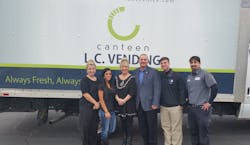Fifteen miles north of the Alabama border sits Fayetteville, TN, a small city with big ideas. Fayetteville produced notable sports figures Anthony Shelton and Bob Higgins. It boasts the slogan Where tradition meets tomorrow. It is also home to Lincoln County Vending.
Not all businesses have personalities, but Lincoln County Vending does. Its personality takes the shape of those who work inside its walls and live in the surrounding community. Much like the city in which it resides, Lincoln County Vending is a small company with big ideas. Like most vending operations, Lincoln County Vending began as a family business based out of a garage. Although the garage has now turned into a (6,000 square foot) warehouse and office space, the company remains family and community focused.
Customer service is a top priority for the company not because it makes them money, but because their customers are their friends, their neighbors and the reason for their success. It is the company’s credence to provide the best quality service to local businesses so those businesses can focus being the best at what they do.
And as the community grows, so too does Lincoln County Vending. What once began as a two-man vending operation, Lincoln County Vending has now been in business for twenty-five years and expanded its offerings to include micro markets, coffee service, cafeteria, janitorial and catering services.
To ensure its future in the vending industry and place in its community, Lincoln County Vending has made several key investments in areas such as technology and micro markets. In just the last ten years Holt has seen his business grow 700 percent, his staff develop to 45 employees and his annual sales increase to (XX).
Path to vending
Lincoln County Vending opened its doors for business on February 1, 1989 as a Tom’s Foods distributor called Dan’s Snack Sales. The company consisted of nine machines, one truck and two men— father-son duo Dan Holt Sr. and Dan Holt Jr. “We started out with absolutely nothing,” recalled Holt. “We would service machines, come home and count the coins on the kitchen table once a month. But we grew our vending business by adding one machine at a time.”
Although Holt enjoyed servicing retail with product as a distributor, he had bigger ambitions for vending. So in (year) when Holt’s father decided to retire, Holt purchased his father’s share of the business and renamed it Lincoln County Vending.
Through the 1990s, Holt remained a Tom’s distributor but continued growing his vending business. “I saw an opportunity in vending and just decided that was where I wanted to go,” he recalls. And in 2005 Lincoln County Vending left the distribution segment and became a Canteen franchise. “We had seen all that they could do in vending and we were very eager to jump on board,” said Holt.
But Holt wasn’t the only one eager about vending. His wife, Pattie, and their four children Holly, Carlie, Daniel and Levi helped run the company early on and continue to aid in its growth. “We all spend a lot of time together, and we’re a stronger family because of it,” Holt said.
Family involvement has been instrumental. “When the company began to grow in the 1990s, my wife would take the kids around after school to fill the machines,” said Holt. “Nowadays I feel secure that our business will be here for years to come.” Holt jokes that he is waiting for the time when his grandkids come of age and can join the business. “We’ll make them work.”
It’s because his family, his employees and his community count on the success of Lincoln County Vending that Holt considers every risk and opportunity before investing in anything, and at first, that included technology.
Growing with technology
For over a decade Holt had grown LCV one machine, one truck, one employee and one decision at a time. He and his staff would meticulously study the industry to determine which investments would help grow the industry. In 2002 that scrutiny focused on technology when Holt traveled to his first annual NAMA show. “I remember going around and talking with the VMS distributors, looking at the bill and coin counters and just being so excited,” said Holt. “At that time we were still counting everything by hand and entering it in on a spreadsheet.” When MEI told Holt he could purchase an all-in-one mechanism that would count the money for him and file data electronically, he was blown away. “Technology changed my life and my business,” he said.
Since that day nearly 13 years ago, Holt has continuously looked at ways to improve and upgrade the company through technology. “No one has to convince or sell me on the importance of technology anymore,” he said.
All of LCV machines going out in the field now have credit card readers and it’s Holt’s goal to transition the other active machines to 100 percent cashless within the next year or two. Currently 30 percent of LCV vending machines are cashless. “We are at the same point now with credit card readers as we were with bill collectors 25 years ago,” he said. “Today you’d never think of putting out a vending machine without a bill acceptor, and it’s got to be the same sentiment with credit card readers.” Integrating technology has streamlined Holt’s business, cut down on route time and increased sales for drivers.
But Holt does admit that with new technology came a lot of data he and his employees had to learn to interpret. “Technology was hard at the beginning to learn, but we did it.” He advises other operators who want to stay in business to do the same thing. “Invest in technology,” he stressed. “There will always be a return on investment when it comes to technology, so why not invest in something that will get you more money?”
Here to stay
One of Holt’s most recent investments took a little convincing. When the micro market segment was first introduced, Holt was hesitant. “I wasn’t sure I wanted to do it,” he said. But as he watched other operators place micro markets, he realized that it was a segment that wasn’t going away. And he surely wasn’t going to be left behind. In 2013 the company opened its first micro market with Avanti Markets. Now, two years later, LCV has grown to (blank) locations and is about ready to start its second micro market route.
It didn’t take long for Holt to see the positives of micro markets, and that includes the return on investment. “I’ve had some micro market locations that are double the sales that vending would be,” he said. “A vending location will have its best sales in its first week, whereas micro market sales will increase for a few months.”
LCV has also been able to use the commissary it purchased in 2004 to offer fresh food to micro markets. “With our commissary, we’re able to make anything and we’re able to do it in a timely manner,” said Holt. Other micro markets, he says, will have to wait a few days to get fresh food, but his company can make it and get it out to the market within a day or two.
Although LCV is limited in its territorial expansion, it has been able to grow year-by-year because of its micro market and OCS segments.
Premium coffee
Part of Holt’s job is to study the industry and watch trends. Just as he recognized that micro markets were becoming part of the industry, he also saw the opportunity to expand coffee service. Five years ago, he would not have believed coffee would be one of his most successful segments, because not much attention was paid to the service. The rise of single cup and the coffee house experience, however, changed that. “We were missing out on coffee back then,” he remarked. “But not anymore.”
LCV services OCS accounts in large industrial plants and small offices. In all locations, Holt sees continued growth and higher profits as more consumers are becoming aware of ‘premium’ blends. The company has its own private label specialty brand called Highland Estates Coffee, which it markets as a premium blend. “We have seen that better coffees drive the market,” said Holt.
Single-cup coffee has been selling well in many of Holt’s locations. He has noticed, however, that while it hasn’t sold as well in his micro markets. “We haven’t had a good response in micro markets with single cup, and I believe that’s just because people don’t want to make their own cup of coffee.” As his micro market locations to grow, Holt says he will continue to monitor the best way of selling coffee in micro markets.
So much more to come
Holt is excited about the future of Lincoln County Vending and the industry in general. Even more rewarding for him, however, is that he gets to share the company’s future with his family, his employees and his community. “We rely on one another,” he said. “We need to be the best at our jobs so our customers can be the best at theirs.”
In the last 15 years, LCV has made meticulous investments and many improvements to be the best. “People are still going to eat and we must change with what we offer and how we offer it,” he said. That means taking opportunities as they come and leading one step at a time.
Community conscious
Lincoln County Vending supports and gives back to its surrounding community because of all that the community has done for them. Dan and Pattie Holt have established and awarded multiple scholarships each year to college students in the area, including the Lincoln County Vending Scholarship and the Shoney’s Fayetteville Scholarship at Motlow College. “We do what we can for the community,” said Holt, “because they give so much to us.”
For several years LCV has been involved in the community’s Jack & Back Bike-a-thon, a Tractor Day for a local high school, Safety Rewards Events and summer picnics. They have even purchased scoreboards for the local high schools. “In our case, we get the most pleasure out of giving to others.”
Multiple business interests
Dan Holt Jr. is a serial entrepreneur. In addition to his vending company, Holt and his family own five restaurants in the Fayetteville, TN area. “Our ownership of restaurants came out of our cafeteria business,” said Holt. “We began with one restaurant, did pretty well with it so we bought another one and so forth.” Holt just signed a deal to build three more restaurants.
Company Profile
Founded: 1989
Headquarters: Fayetteville, TN
Owners: Dan and Pattie Holt
Number of employees: 45
Number of routes: (14?)
Annual sales: (XX)

Adrienne Klein | Contributing Editor
Adrienne Zimmer Klein is a freelance writer with a background in the vending, micro market and office coffee service industry. She worked as an associate editor and managing editor at Automatic Merchandiser and VendingMarketWatch.com from 2013 until 2017. She is a regular contributing writer at Automatic Merchandiser.





